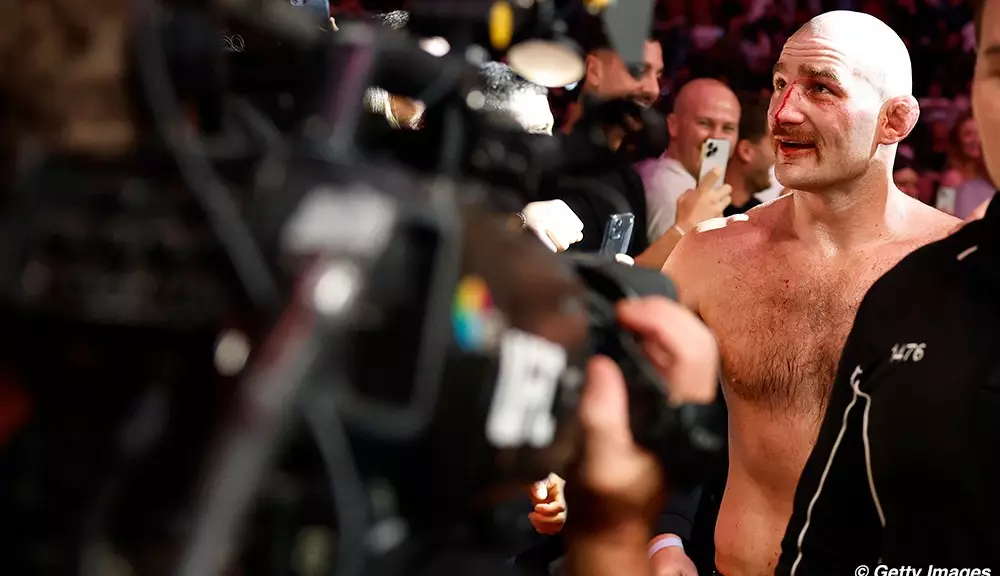The world of mixed martial arts (MMA) is no stranger to fierce rivalry and colorful personalities. Among these, Sean Strickland and Belal Muhammad stand out, particularly after Strickland’s recent performance at UFC 312. Strickland’s journey in the UFC, oscillating between welterweight and middleweight categories, has drawn both admiration and criticism, particularly from Muhammad, the reigning UFC welterweight champion. This article delves into the evolving dynamics of their rivalry and reflects on how it shapes the larger picture of the UFC.
Sean Strickland, a fighter known for his brash demeanor and striking capabilities, has had a career filled with ups and downs. From 2015 to 2018, he established himself in the welterweight division, where he accumulated an impressive record. However, after a serious motorcycle accident sidelined him for two years, he returned to the octagon with a different approach. In 2023, Strickland shocked the MMA community by dethroning Israel Adesanya to capture the middleweight title. Despite this success, his recent defeat to Dricus Du Plessis raises questions about his status as a top contender.
Strickland’s fighting style has often been a topic of debate among fans and analysts alike. His penchant for staying on the outside and relying on jabs and kicks rather than engaging in more aggressive exchanges has led some to label him as risk-averse or overly cautious. His latest fight, characterized by a clear lack of urgency despite trailing on the scorecards, only compounded these criticisms. This brings to light the essence of Strickland’s persona as both a warrior in the ring and a provocateur outside of it.
In stark contrast to Strickland, Belal Muhammad’s approach reflects a balance of strategy and aggression—a trait that has served him well leading up to and during his UFC championship reign. Muhammad, who claimed the welterweight title after defeating Leon Edwards, has built a reputation as a fighter who mixes technical skill with a fierce fighting spirit. His critiques of Strickland are severe and showcase a confidence that has become characteristic of Muhammad.
Following Strickland’s loss to Du Plessis, Muhammad didn’t hold back in expressing his disdain for Strickland’s performance, dismissing him as unworthy of the title challenger moniker. His comments underscore a crucial aspect of the MMA landscape: the nature of rivalry isn’t merely about performances; it also encompasses personal egos, bravado, and the personas fighters cultivate within the sport. Muhammad’s statements, where he characterized Strickland as a “coward” and “racist little clown,” exemplify the psychological warfare that is prevalent in MMA rivalries.
The aftermath of a loss often leads fighters to either step up and accept the defeat or make excuses. According to Muhammad, Strickland is likely to blame an alleged staph infection for his poor performance against Du Plessis. This reaction highlights a broader theme in competitive sports: the struggle between accountability and maintaining a certain public image. Excuses can tarnish a fighter’s legacy, while acknowledgment of defeat can foster strength and resilience.
As Strickland continues to navigate his career post-defeat, the expectation is that he will need to reevaluate his strategies both inside and outside the octagon. The pattern of making excuses might not only affect how he is perceived but could potentially damage his prospects for future title shots.
While Strickland may have seen his wrestling aspirations in the middleweight division come to an end with his recent loss, Belal Muhammad is poised to defend his welterweight title soon. With a matchup against Shavkat Rakhmonov on the horizon, the spotlight is on Muhammad to solidify his claim as a champion while Strickland must grapple with a turbid path forward. Their careers, although briefly intertwined, display the broader complexity of combat sports, where athletes are not just fighting opponents but also personas shaped by rivalries, public sentiment, and personal narratives.
As fans await their next moves, one can only speculate about the implications these rivalries will have in the ever-evolving world of the UFC. These dynamics not only affect the fighters but also shape the narratives that draw audiences into the octagon, making every bout a spectacle not just of physical skill, but of psychic warfare.

